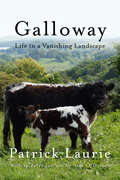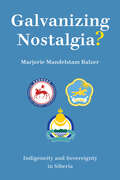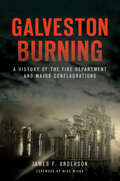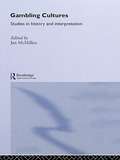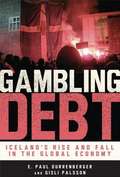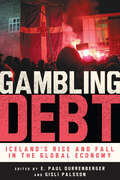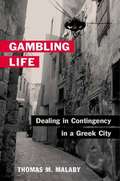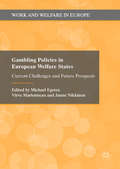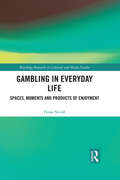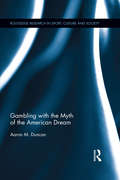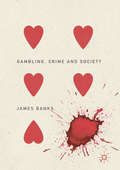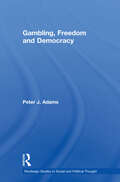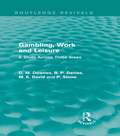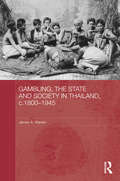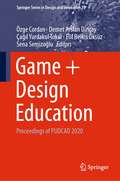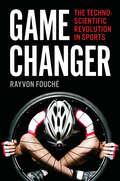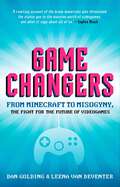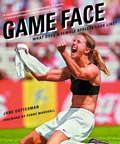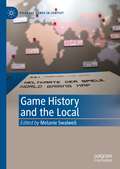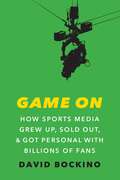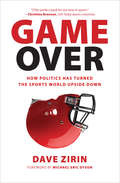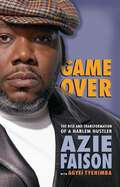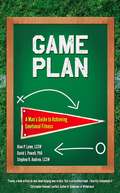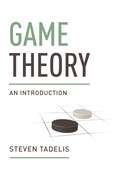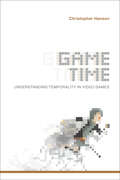- Table View
- List View
Galloway: Life In a Vanishing Landscape
by Patrick LaurieOn the land of his ancestors in Scotland, a young farmer struggles to find a balance between farming, the conservation of wild, and human culture as he establishes a herd of heritage cattle.Galloway, an ancient region in an obscure corner of Scotland, has a proud and unique heritage based on hardy cattle and wide moors. But as the twentieth century progressed, the people of Galloway deserted the land and the moors are transforming into a vast commercial forest. Desperate to connect with his native land, Patrick Laurie plunges into work on his family farm. Investing in the oldest and most traditional breeds of Galloway cattle, he begins to discover how cows—and the special care that this breed requires—once shaped people, places, and nature in this remote and half-hidden place. As the cattle begin to dictate the pattern of his life, Laurie stumbles upon another loss; the new forests have driven the catastrophic decline of the much-loved curlew, a bird that features strongly in Galloway's consciousness. The links between people, cattle, and wild birds become a central theme as Laurie begins to face the reality of life in a vanishing landscape. Exploring the delicate balance between farming and conservation while recounting an extraordinarily powerful personal story, Galloway delves into the relationship between people and places under pressure in the modern world.
Galvanizing Nostalgia?: Indigeneity and Sovereignty in Siberia
by Marjorie Mandelstam BalzerGalvanizing Nostalgia? explores critical questions for the survival of Russia in its nominally federal form. Will Russia fall apart along the lines of its internal republics, as did the Soviet Union? Based on cultural anthropology field and historical research in major republics of Eastern Siberia—Sakha (Yakutia), Buryatia, and Tyva (Tuva)—this book highlights Indigenous concerns about self-determination.Marjorie Mandelstam Balzer suggests that a fragile and disorganized dynamic of nested sovereignties has developed within Russia. Ecology activism has grown, given new threats to the environment and accelerating climate challenges, especially in the Arctic. Focus on strategically chosen republics enables comparing and contrasting interethnic relations, language politics, and the salience of gender, demography, resource competition, environmental degradation, and increased spirituality. Republics vary in their neocolonial relationships to Moscow authorities. Some local leaders, such as a politicized shaman, use nostalgia for cultural achievements to galvanize citizens. Since the Soviet Union collapsed, cultural and political revitalization have been relatively more viable, although still difficult, in areas where Siberians have their own republics.
Galveston Burning: A History of the Fire Department and Major Conflagrations (Disaster)
by James F. AndersonSince 1821, when Jean Lafitte sailed away from a burning Campeche, the history of Galveston has often been wreathed in smoke. Over the next century, one inferno breached the walls of Moro Castle, while another reduced forty-two blocks of the residential district to ash. Recognizing the importance of protecting the city, concerted efforts were made to establish the first paid fire department, create a city waterworks and regulate construction standards. Yet even with all the forethought and planning, rogue fires continued to consume architectural gems like Nicholas Clayton's Electric Pavilion. Author James F. Anderson explores the lessons that Galveston has learned from its fiery past in order to safeguard its future.
Gambling Cultures: Studies in History and Interpretation (Culture: Policy and Politics)
by Jan McMillenFirst published in 1996. Routledge is an imprint of Taylor & Francis, an informa company.
Gambling Debt
by E. Paul Durrenberger Gisli PalssonGambling Debt is a game-changing contribution to the discussion of economic crises and neoliberal financial systems and strategies. Iceland's 2008 financial collapse was the first case in a series of meltdowns, a warning of danger in the global order. This full-scale anthropology of financialization and the economic crisis broadly discusses this momentous bubble and burst and places it in theoretical, anthropological, and global historical context through descriptions of the complex developments leading to it and the larger social and cultural implications and consequences. Chapters from anthropologists, sociologists, historians, economists, and key local participants focus on the neoliberal policies-mainly the privatization of banks and fishery resources-that concentrated wealth among a select few, skewed the distribution of capital in a way that Iceland had never experienced before, and plunged the country into a full-scale economic crisis. Gambling Debt significantly raises the level of understanding and debate on the issues relevant to financial crises, painting a portrait of the meltdown from many points of view-from bankers to schoolchildren, from fishers in coastal villages to the urban poor and immigrants, and from artists to philosophers and other intellectuals.This book is for anyone interested in financial troubles and neoliberal politics as well as students and scholars of anthropology, sociology, economics, philosophy, political science, business, and ethics. Publication supported in part by the National Science Foundation.
Gambling Debt: Iceland's Rise and Fall in the Global Economy
by E. Paul Durrenberger and Gisli PalssonGambling Debt is a game-changing contribution to the discussion of economic crises and neoliberal financial systems and strategies. Iceland’s 2008 financial collapse was the first case in a series of meltdowns, a warning of danger in the global order. This full-scale anthropology of financialization and the economic crisis broadly discusses this momentous bubble and burst and places it in theoretical, anthropological, and global historical context through descriptions of the complex developments leading to it and the larger social and cultural implications and consequences. Chapters from anthropologists, sociologists, historians, economists, and key local participants focus on the neoliberal policies—mainly the privatization of banks and fishery resources—that concentrated wealth among a select few, skewed the distribution of capital in a way that Iceland had never experienced before, and plunged the country into a full-scale economic crisis. Gambling Debt significantly raises the level of understanding and debate on the issues relevant to financial crises, painting a portrait of the meltdown from many points of view—from bankers to schoolchildren, from fishers in coastal villages to the urban poor and immigrants, and from artists to philosophers and other intellectuals. This book is for anyone interested in financial troubles and neoliberal politics as well as students and scholars of anthropology, sociology, economics, philosophy, political science, business, and ethics. Publication supported in part by the National Science Foundation. Contributors: Vilhjálmur Árnason, Ásmundur Ásmundsson, Jón Gunnar Bernburg, James Carrier, Sigurlína Davíðsdóttir, Dimitra Doukas, Níels Einarsson, Einar Mar Guðmundsson, Tinna Grétarsdóttir, Birna Gunnlaugsdóttir, Guðný S. Guðbjörnsdóttir, Pamela Joan Innes, Guðni Th. Jóhannesson, Örn D. Jónsson, Hannes Lárusson, Kristín Loftsdóttir, James Maguire, Már Wolfgang Mixa, Evelyn Pinkerton, Hulda Proppé, James G. Rice, Rögnvaldur J. Sæmundsson, Unnur Dís Skaptadóttir, Margaret Willson
Gambling Life: DEALING IN CONTINGENCY IN A GREEK CITY
by Thomas M. MalabyThe only ethnography devoted to the practice of gambling as its core subject, Gambling Life considers the stakes of social action in one community on the island of Crete. Backgammon cafés, card clubs, and hidden gambling rooms in the city of Chania provide the context for Thomas M. Malaby to examine the ways in which people confront uncertainty in their lives. He shows how the dynamics of gambling -- risk, fate, uncertainty, and luck -- are reflected in other aspects of gamblers' lives from courtship and mortality to state bureaucracy and national identity. By moving beyond risk and fate as unexamined analytical categories, Malaby presents a new model for research concerning indeterminacy, seeing it as arising from stochastic, performative, and other sources. Gambling Life questions the longstanding valorization of order and pattern in the social sciences.
Gambling Policies in European Welfare States: Current Challenges and Future Prospects (Work and Welfare in Europe)
by Michael Egerer Virve Marionneau Janne NikkinenThis edited book draws on a cross-cultural and historical lens to theoretically and practically analyse gambling regulations and the use of gambling revenue. It takes on a broad spectrum of perspectives, from the origin of the money, to the regulators, operators and beneficiaries of gambling, and looks at the interests, networks and power relations involved.This multidisciplinary collection elicits a shift in analysis, shedding light on a broader societal, historical and economic view of gambling and gambling policies, by its attention to implicit networks of power, influential legislation, gambling provision and infrastructure.Gambling Policies in European Welfare States will be of interest to students and scholars alike who are seeking cross-national and interdisciplinary analyses of welfare, politics, sociology and economics.
Gambling in Everyday Life: Spaces, Moments and Products of Enjoyment (Routledge Research in Cultural and Media Studies)
by Fiona Jean NicollThe book adopts a critical cultural studies lens to explore the entanglement of government and gambling in everyday life. Its qualitative approach to gambling creates a new theoretical framework for understanding the most urgent questions raised by research and policy on gambling. In the past two decades, gambling industries have experienced exponential growth with annual global expenditure worth approximately 300 billion dollars. Yet most academic research on gambling is concentrated on problem gambling and conducted within the psychological sciences. Nicoll considers gambling at a moment when its integration within everyday cultural spaces, moments, and products is unprecedented. This is the first interdisciplinary cultural study of gambling in everyday life and develops critical and empirical methods that capture the ubiquitous presence of gambling in work, investment and play. This book also contributes to the growing cultural studies literature on video and mobile gaming. In addition to original case studies of gambling moments and spaces, in-depth interviews and participant observations provide readers with an insider’s view of gambling. Advanced students of sociology, cultural theory, and political science, academic researchers in the field of gambling studies will find this an original and useful text for understanding the cultural and political work of gambling industries in liberal societies.
Gambling with the Myth of the American Dream (Routledge Research in Sport, Culture and Society #44)
by Aaron M. DuncanThis book explores the rise and increased acceptance of gambling in America, particularly the growth of the game of poker, as a means for examining changes to the American Dream and the risk society. Poker both critiques and reinterprets the myth of the American Dream, putting greater emphasis on the importance of luck and risk management while deemphasizing the importance of honesty and hard work. Duncan discusses the history of gambling in America, changes to the rhetoric surrounding gambling, the depiction of poker in the Wild West as portrayed in film, its recent rise in popularity on television, its current place in post-modern America on the internet, and future implications.
Gambling, Crime and Society
by James BanksThis book explores the manifold actual, possible and probable interconnections between gambling and crime in the context of the increased availability of wagering activities across many regions of the world. It examines the impact of the proliferation and propinquity of land-based betting establishments on crime, the role of organised crime in the provision of both licit and illicit forms of gambling, as well as problem gambling, crime and the administration of criminal justice. It also assesses the links between gambling, sport and corruption and the dimensions of crime that takes place in and around internet gambling sites. A thought-provoking study, this will be of particular interest to scholars in the fields of sociology, criminology and social policy.
Gambling, Freedom and Democracy (Routledge Studies in Social and Political Thought)
by Peter J. AdamsAs a consequence of the rapid proliferation of commercial gambling in Western-style democracies, governments and communities are encountering a complex array of economic, social and cultural harms associated with this expansion. This book focuses specifically on harms to democratic systems. It examines how people with key roles in democratic structures are vulnerable to subtle influence from the burgeoning profits of gambling. It focuses particularly on the Western-style democracies of North America, Europe and Australasia. It argues that governments have a duty of care to protect their own democratic processes from subtle degradations and that independence from the gambling industries needs to be proactively built into public sector structures and processes. It outlines how a public health approach, harm minimisation strategies and international conventions can provide the base for protecting the integrity of democratic systems.
Gambling, Work and Leisure: A Study Across Three Areas (Routledge Revivals)
by David Downes D. M. Davies M. E. David P. StoneSince the legalisation of off-course cash betting in 1960, and the rise of varying forms of gambling, the British have come to be known as a nation of gamblers. Until this study was published in 1976, barely any evidence existed against which to assess the claim that gambling had become a major social problem. The authors present data drawn from area surveys carried out in Swansea, Sheffield, Wanstead and Woodford, and explore how well previous sociological theories of gambling agree with their findings, particular in connection with certain aspects of work and leisure. Examining different forms of gambling, including betting, bingo and gaming machines, the chapters consider how gambling choices vary between different social groups, and how much time and money is spent on them. With the internet making it easier than ever before to place bets, this title is especially relevant, and provides a systematic basis for an explanation of gambling in relation to social structure.
Gambling, the State and Society in Thailand, c.1800-1945 (Routledge Studies in the Modern History of Asia)
by James A. WarrenDuring the nineteenth century there was a huge increase in the level and types of gambling in Thailand. Taxes on gambling became a major source of state revenue, with the government establishing state-run lotteries and casinos in the first half of the twentieth century. Nevertheless, over the same period, a strong anti-gambling discourse emerged within the Thai elite, which sought to regulate gambling through a series of increasingly restrictive and punitive laws. By the mid-twentieth century, most forms of gambling had been made illegal, a situation that persists until today. This historical study, based on a wide variety of Thai- and English-language archival sources including government reports, legal cases and newspapers, places the criminalization of gambling in Thailand in the broader context of the country’s socio-economic transformation and the modernization of the Thai state. Particular attention is paid to how state institutions, such as the police and judiciary, and different sections of Thai society shaped and subverted the law to advance their own interests. Finally, the book compares the Thai government’s policies on gambling with those on opium use and prostitution, placing the latter in the context of an international clampdown on vice in the early twentieth century.
Game + Design Education: Proceedings of PUDCAD 2020 (Springer Series in Design and Innovation #13)
by Özge Cordan Demet Arslan Dinçay Çağıl Yurdakul Toker Elif Belkıs Öksüz Sena SemizoğluThis book gathers the papers of the PUDCAD Universal Design Practice Conference: Game + Design Education, organized by Istanbul Technical University and held online on June 24-26, 2020. The conference represented one of the key events of the Practicing Universal Design Principles in Design Education through a CAD-Based Game (PUDCAD) project, which developed a design game on a CAD-based platform, enabling students and designers to learn about universal design principles and develop accessible and innovative design ideas. As such, the PUDCAD project met one of the foremost goals of the European Commission, making sure the inclusion and efficient accessibility for people with disabilities into everyday life. The main topics of the conference include: universal design and education, universal design and user experience, game and design studies, gamification, virtual reality experiment, e-learning in design, and playful spaces and interfaces. The contributions, which were selected by means of a rigorous international peer-review process, highlight numerous exciting ideas that will spur novel research directions and foster multidisciplinary collaboration among different specialists.
Game Changer: The Technoscientific Revolution in Sports
by Rayvon FouchéHow has technology challenged the notion of unadulterated athletic performance?We like to think of sports as elemental: strong bodies trained to overcome height, weight, distance; the thrill of earned victory or the agony of defeat in a contest decided on a level playing field. But in Game Changer, Rayvon Fouché argues that sports have been radically shaped by an explosion of scientific and technological advances in materials, training, nutrition, and medicine dedicated to making athletes stronger and faster. Technoscience, as Fouché dubs it, increasingly gives the edge (however slight) to the athlete with the latest gear, the most advanced training equipment, or the performance-enhancing drugs that are hardest to detect. In this revealing book, Fouché examines a variety of sports paraphernalia and enhancements, from fast suits, athletic shoes, and racing bicycles to basketballs and prosthetic limbs. He also takes a hard look at gender verification testing, direct drug testing, and the athlete biological passport in an attempt to understand the evolving place of technoscience across sport. In this book, Fouché: • Examines the relationship among sport, science, and technology• Considers what is at stake in defining sporting culture by its scientific knowledge and technology• Provides readers and students with an informative and engagingly written studyFocusing on well-known athletes, including Michael Phelps, Oscar Pistorius, Caster Semenya, Usain Bolt, and Lance Armstrong, Fouché argues that technoscience calls into question the integrity of games, records, and our bodies themselves. He also touches on attempts by sporting communities to regulate the use of technology, from elite soccer's initial reluctance to utilize goal-line technology to automobile racing's endless tweaking of regulatory formulas in an attempt to blur engineering potency and reclaim driver skill and ability. Game Changer will change the way you look at sports—and the outsized impact technoscience has on them.
Game Changers: From Minecraft To Misogyny: The Fight For The Future Of Videogames
by Dan Golding Leena Van DeventerThe videogame scene has evolved from the hobby of boys in bedrooms to a popular pastime for anyone with a smartphone. Many of the old guard resent this mainstreaming of games culture -- and they've been anything but welcoming. These trolls have created a climate of fear by abusing and harassing women, minorities and anyone who has dared to speak out against misogyny and other problems in the boys' club industry. Game Changers puts these conflicts under the microscope, in Australia and overseas. The book features exclusive interviews with many key figures working to make the videogame world a safe space, including Anita Sarkeesian and Zoë Quinn, two of the women at the centre of the Gamergate abuse. In 2015, they were asked by the United Nations to lead a panel discussion on the 'rising tide of online violence against women and girls'. Authors Dan Golding and Leena van Deventer use their extensive experience in the videogame industry, both as players and professionals, to examine how games culture is growing, diversifying and changing for the better.
Game Face: What Does a Female Athlete Look Like?
by Jane GottesmanThe extraordinary collection of photographs and rich personal stories that make upGame Facedocuments the tremendous impact that sports has on the daily lives of millions of girls and women. On playing fields and street corners, in backyards and gyms, the people in this arresting array of pictures are unselfconsciously exploring the physical and emotional pleasures of competition and play. Each image offers an affirming and satisfying answer to the question at the heart ofGame Face: What do girls and women look like, freed from traditional feminine constraints, using their bodies in joyful and empowering ways? When Title IX was passed in 1972, only one out of twenty-seven school-age girls played sports. Now one in three does. Yet their expanding involvement in sports is still largely overlooked by the media, and as a consequence, millions of young female athletes crave not only role models but an authentic and appealing reflection of their own athleticism. As a young sports journalist, Jane Gottesman was all too aware of this imbalance, and saw the need for a book that honors both our top female athletes and the everyday girls and women whose self-image is strengthened through athletic participation. With the goal of showing America what women's sports looks like, she searched through the work of our country's best photographers, from the newest photojournalists to artists such as Annie Leibovitz and Ansel Adams. The result isGame Face, a unique and inspiring selection of color and black-and-white photographs, a text with first-person accounts by athletes, and an illustrated time line of women's athletic milestones. Published simultaneously with the opening of an important exhibition at the Smithsonian Institution that will tour for five years,Game Facehas been endorsed by the Girl Scouts of the USA, who've developed aGame Facepatch, the NCAA, and the YWCA of the USA. An inspiring gift for an athlete of any age, this powerful, timely book takes one of art's most studied subjects the female body and celebrates it in a brand-new way.
Game History and the Local (Palgrave Games in Context)
by Melanie SwalwellThis book brings together essays on game history and historiography that reflect on the significance of locality. Game history did not unfold uniformly and the particularities of space and place matter, yet most digital game and software histories are silent with respect to geography. Topics covered include: hyper-local games; temporal anomalies in platform arrival and obsolescence; national videogame workforces; player memories of the places of gameplay; comparative reception studies of a platform; the erasure of cultural markers; the localization of games; and perspectives on the future development of ‘local’ game history.Chapters 1 and 12 are available open access under a Creative Commons Attribution 4.0 International License via link.springer.com.
Game On: How Sports Media Grew Up, Sold Out, and Got Personal with Billions of Fans
by David BockinoGame On tells the story of how and why the sports media industry grew to become one of the most important and profitable components of the global entertainment landscape.
Game Over: How Politics Has Turned the Sports World Upside Down
by Dave Zirin&“Enlightening&” essays on athletes, activism, and the important role sports plays in our society (Publishers Weekly). Sportscaster Howard Cosell dubbed it &“rule number one of the jockocracy&”: sports and politics just don&’t mix. But in truth, some of our most important debates about class, race, religion, sex, and the raw quest for political power are played out both on and off the field. From the NFL lockout and the role of soccer in the Arab Spring to the Penn State sexual abuse scandals and Tim Tebow&’s on-field genuflections, this timely and hard-hitting new book from the &“conscience of American sports writing&” offers new insights and analysis of headline-grabbing sports controversies (The Washington Post). It explores the shady side of the NCAA; the explosive 2011 MLB All-Star Game; and why the Dodgers crashed and burned. It covers the fascinating struggles of gay and lesbian athletes to gain acceptance, female athletes to be more than sex symbols, and athletes everywhere to assert their collective bargaining rights as union members. Dave Zirin also illustrates the ways that athletes are once again using their exalted platforms to speak out and reclaim sports from the corporate interests that have taken it hostage. In Game Over, he cheers the victories—but also reflects on how far we have yet to go. &“A book that no thinking sports fan can afford to miss.&” —Jonathan Mahler, author of Ladies and Gentlemen, The Bronx Is Burning
Game Over: The Rise and Transformation of a Harlem Hustler
by Azie Faison Agyei TyehimbaA cautionary tale about the life of former kingpin Azie Faison, who has become the fabric of street legend Faison was a ninth grade dropout who earned more than $100,000 a week selling cocaine in Harlem, New York, during the peak of America's "War on Drugs" between 1983 and 1990. Faison, along with two partners, was an urban prince with cars, jewels, and people -- in awe of this million-dollar phenomenon -- at his feet. His legacy has been praised by hip-hop's top names in their lyrics, and his life was the basis for the urban cult classic film Paid in Full starring Mekhi Phifer, Wood Harris, and rapper Cam'ron and produced by Jay-Z's Roc-A-Fella Films. In Game Over, Azie brings forth a powerful memoir of New York's perilous drug underworld and music industry, with an intellect and wisdom to empower and challenge the street culture he knows so very well.
Game Plan
by Stephen Andrew David J. Powell Alan LymeIf you're a man, get ready to unleash the hero inside, and if you're a woman, get ready to understand men like never before. This practical and provocative book is packed with the lessons your dad never taught you about living life to the fullest, free from addiction and other self-destructive behaviors. From "Growing up Male" to "Men and Their Children," Game Plan tells it the way only a man sees it and only as a man can hear it. David J. Powell, PhD, is president of the International Center for Health Concerns, Inc. and assistant clinical professor of psychiatry at Yale University School of Medicine. He trains internationally on clinical supervision, family therapy, and men's issues in recovery. He is the author of Playing Life's Second Half: A Man's Guide for Turning Success into Significance. Alan Philip Lyme, LCSW, is clinical supervisor for the Screening, Brief Intervention, and Referral to Treatment Grant Program in Georgia. Alan is a Motivational Interviewing trainer, an internationally certified clinical supervisor, and an internationally certified alcohol and drug counselor. Stephen R. Andrew, LCSW, is an international consultant and trainer. He serves as the chief energizing officer for Health Education & Training Institute in Portland, Maine. Stephen is a true visionary and is the creator of SpiritWind, a CD series for personal growth and recovery.
Game Theory: An Introduction
by Steven TadelisThe definitive introduction to game theoryThis comprehensive textbook introduces readers to the principal ideas and applications of game theory, in a style that combines rigor with accessibility. Steven Tadelis begins with a concise description of rational decision making, and goes on to discuss strategic and extensive form games with complete information, Bayesian games, and extensive form games with imperfect information. He covers a host of topics, including multistage and repeated games, bargaining theory, auctions, rent-seeking games, mechanism design, signaling games, reputation building, and information transmission games. Unlike other books on game theory, this one begins with the idea of rationality and explores its implications for multiperson decision problems through concepts like dominated strategies and rationalizability. Only then does it present the subject of Nash equilibrium and its derivatives.Game Theory is the ideal textbook for advanced undergraduate and beginning graduate students. Throughout, concepts and methods are explained using real-world examples backed by precise analytic material. The book features many important applications to economics and political science, as well as numerous exercises that focus on how to formalize informal situations and then analyze them.Introduces the core ideas and applications of game theoryCovers static and dynamic games, with complete and incomplete informationFeatures a variety of examples, applications, and exercisesTopics include repeated games, bargaining, auctions, signaling, reputation, and information transmissionIdeal for advanced undergraduate and beginning graduate studentsComplete solutions available to teachers and selected solutions available to students
Game Time: Understanding Temporality in Video Games (Digital Game Studies)
by Christopher HansonPausing, slowing, rewinding, replaying, reactivating, reanimating . . . Has manipulating video game timelines altered our experience of time? “Compelling.” —ChoiceVideo game scholar Christopher Hanson argues that the mechanics of time in digital games have presented a new model for understanding time in contemporary culture, a concept he calls “game time.” Multivalent in nature, game time is characterized by apparent malleability, navigability, and possibility while simultaneously being highly restrictive and requiring replay and repetition. When compared to analog tabletop games, sports, film, television, and other forms of media, Hanson demonstrates, the temporal structures of digital games provide unique opportunities to engage players with liveness, causality, potentiality, and lived experience that create new ways of experiencing time.Features comparative analysis of key video games titles—including Braid, Quantum Break, Battle of the Bulge, Prince of Persia: The Sands of Time, Passage, The Legend of Zelda: The Ocarina of Time, Lifeline, and A Dark Room.“The text is well-researched, and the introduction is an excellent, focused overview of video game studies.” —Choice
